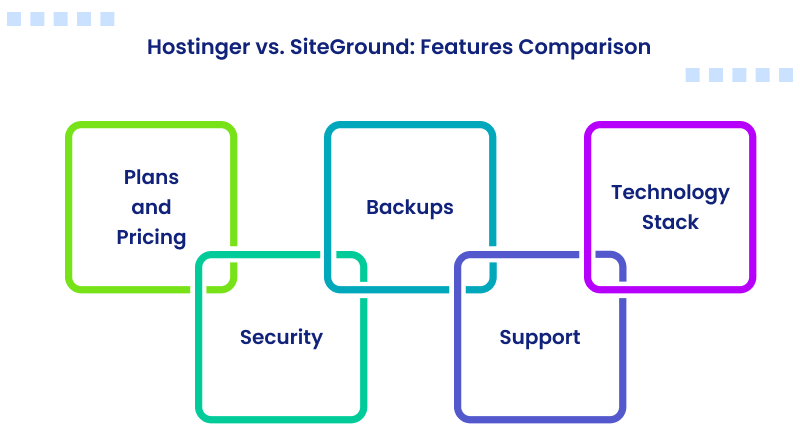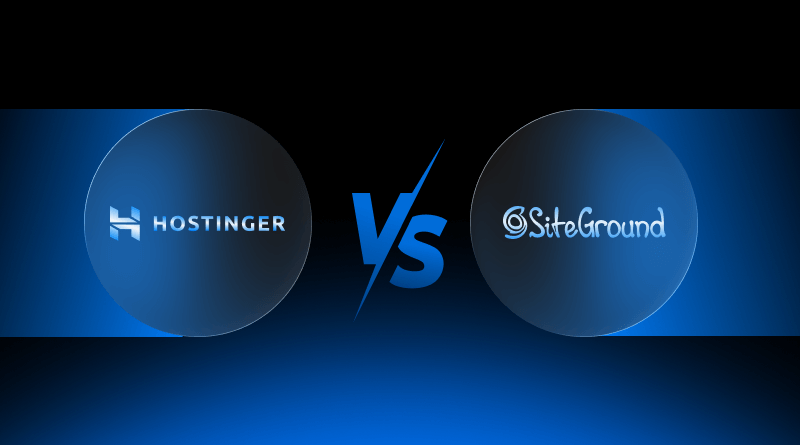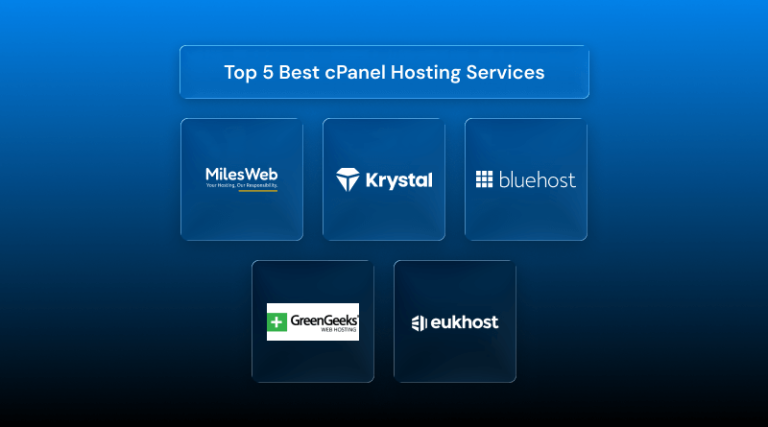Hostinger and SiteGround are both prominent web hosting companies offering a range of web hosting services. Hostinger consistently demonstrated faster page loading speeds in hands-on performance tests conducted by numerous users. Whereas, SiteGround costs you a fraction of renewal rates. The combination of both web hosts is a stronger choice for freelancers, small businesses, and anyone looking for reliable web hosting.
SiteGround bags customer trust by offering premium WordPress features for bigger projects However, budget-conscious users opt for Hostinger to strike a balance between performance and value. So, which one to choose?
This comparison blog of Hostinger vs. SiteGround will help you make the right decision.
Table Of Content
Why Choose Hostinger?
With Hostinger, users enjoy stellar features like an AI website builder, a 1-click WordPress installer, and high-speed web hosting with a 99.9% guaranteed uptime. Beginners can start with shared hosting and later upgrade to cloud or VPS hosting to meet enterprise needs. Hostinger is a good web hosting provider known for user-friendliness, speed, and reliability. They deploy practical AI tools to create a website and troubleshoot it.
Why Choose SiteGround?
SiteGround lays its foundation on the Google Cloud infrastructure. It delivers high-performance hosting with bespoke security features. The web host offers a comprehensive suite of features for small businesses and individual website owners. If you are a technical novice looking for customer support, SiteGround extends its assistance through chat, email, and phone.
Hostinger vs. SiteGround: Features Comparison
| Feature | Hostinger | SiteGround |
| Best For | Beginners, budget-conscious users, small to medium websites | Businesses, agencies, users prioritizing advanced features & support |
| Performance/Speed | Excellent, often faster due to LiteSpeed servers and NVMe storage on higher plans | Great, built on Google Cloud Platform (GCP) and uses custom caching (SuperCacher) |
| Control Panel | Proprietary hPanel (very user-friendly) | Proprietary Site Tools (modern and well-organized) |
| Hosting Types | Shared, WordPress, VPS, Cloud | Shared, WordPress, WooCommerce, Cloud, Reseller |
| Backups | Weekly on lower plans, Daily on higher plans | Daily backups on all plans |
| Customer Support | 24/7 Live Chat and Help Center; no phone support | 24/7 Live Chat, Phone, and Ticket system; known for excellent quality |
| WordPress Features | Solid features, AI website builder | Superior managed WordPress features (staging, on-demand backups) |

1. Plans and Pricing
The pricing gap between Hostinger and SiteGround is obvious due to the difference in core server resources. Hostinger’s starting plan costs £1.90/month, while SiteGround will cost you £3.05/month. The reason for this price gap is that Google Cloud uses 100% renewable energy. Google Cloud is the data center partner of SiteGround.
The value of difference is visible in the entry-level shared hosting plans. With Hostinger’s Business plan, you can host up to 50 websites in the 50 GB SSD storage and get 5 mailboxes per website—free for 1 year. SiteGround, on the other hand, hosts unlimited websites but limits your disk space to 40 GB SSD. Hence, storage-wise, SiteGround restricts your scalability, and Hostinger wins the bet. It is useful for small and medium enterprises starting with a low budget and less traffic.
2. Backups
Website backup is crucial, and if you want to decode its nitty-gritty, check out our ‘How to Take Backup of Your Website?’ Hostinger offers weekly backup as opposed to SiteGround, which relies on daily website backups. It won’t cost you extra. In the case of disaster recovery, SiteGround proves to be more reliable with the daily data backups. You can perform daily backups through SiteGround’s proprietary control panel.
3. Technology Stack
Both web hosts have ample collaborator- and developer-friendly tools. Thus, there is stiff competition between them. Hostinger has an AI website builder, its proprietary control panel (hPanel), and LiteSpeed servers optimized for WordPress. SiteGround has a stack of advanced staging features that will ease your WordPress customization. Its custom control panel allows techies to test, manage, and update WordPress intuitively.
WordPress.org officially recommends Hostinger. Its hPanel is a centralized dashboard to manage multiple websites with AI tools, one-click installs, and auto updates. Hostinger offers a free migration tool with customer support if needed. It makes it easier to migrate your WordPress website without extra cost.
SiteGround’s in-house developed WordPress plugin ensures comprehensive speed and security optimizations. It includes the WordPress Migration plugin for free migration and WooCommerce installation. All SiteGround plans are optimized for WooCommerce with a fast response time backed by the Apache/NGINX server setup.
4. Security
Let’s call it a close tie between Hostinger and SiteGround. Both offer free SSL and advanced DDoS protection. But extra credit should be given for exclusive features. SiteGround has its proprietary WordPress security plugin, SG Security, enabling you to protect the website with several advanced options.
Hostinger adds an extra security protection layer on your website. Get the free malware scanner in contrast to SiteGround’s Site Scanner. Free domain WHOIS privacy protection, web application firewall, Cloudflare-protected nameservers, and the secure access manager are some additional security USPs that shield your data.
5. Support
Professionals hate AI chatbot support, but Hostinger holds the reign in the same. It offers AI chatbot support through Kodee’s AI Chatbot tool. It addresses simple queries raised by clients. Phone support is missing from Hostinger’s end, and thus they only assist on live chat and email.
SiteGround offers phone support, which shows the manual efforts made for customers. On one hand, Hostinger’s AI chatbot shares insightful knowledge bases, blogs, or tutorials as a response to frustrated customers. SiteGround acknowledges the customer’s issue, and hence, you could expect humanized custom responses according to the issue. Users can access their live chat support anytime, and for additional grievances, they offer phone support too.
Both web hosts share the champion crown in the web hosting industry. It ultimately depends on your priority which one to choose. Hostinger dominates the budget-friendly market segment. SiteGround, on the other hand, gets the label of a reliable agency WordPress hosting provider. Neither of them holds a monarchy, as both provide advanced managed features for users.
However, high-volume projects must be automated with n8n only. Although it has a steeper learning curve, its ability to handle complex logic is impeccable. Hence, find your business size and then choose the right automation tool.
FAQs
1. How do the introductory prices of Hostinger and SiteGround compare?
Hostinger normally offers lower introductory prices compared to SiteGround, and its cheapest shared hosting plans start at a slightly lower price, and their renewal fees are significantly lower than SiteGround.
2. How does the uptime guarantee compare between Hostinger and SiteGround?
Hostinger and SiteGround often provide a 99.9% guarantee of uptime, but some sources suggest that the performance of SiteGround more often has a higher uptime of 99.9%.
3. How do the data center locations of Hostinger and SiteGround compare for a global audience?
Hostinger has more data center locations, about seven to twelve data centers across the world, including the United States, the United Kingdom, Europe, Asia, and South America, whereas SiteGround currently uses the Google Cloud data centers in the United States, Europe, and Asia; as a result, Hostinger provides a few more options when it comes to addressing a global audience.
4. What are the main differences between Hostinger’s hPanel and SiteGround’s Site Tools control panel?
The two vendors are both characterized by custom control panels. However, the hPanel of Hostinger is more commonly considered easier and simpler to use by beginners compared to Site Tools of SiteGround, designed to be more performance-focused, easier to operate, and more advanced in managed features.














